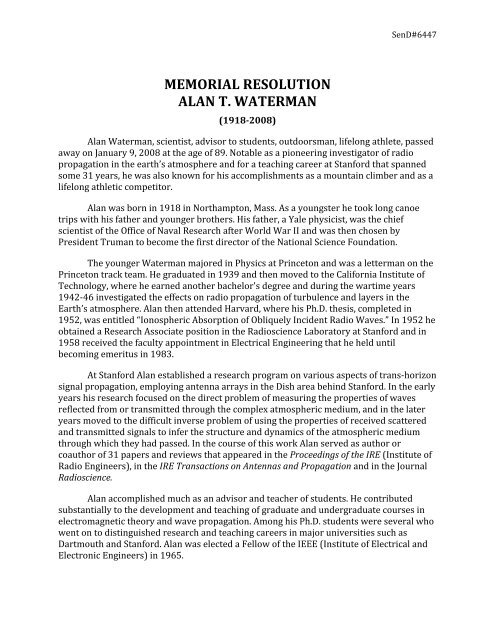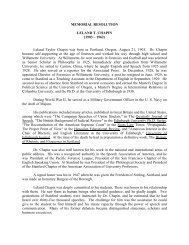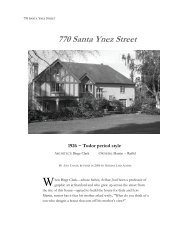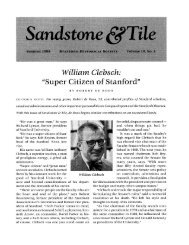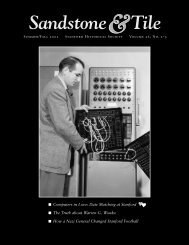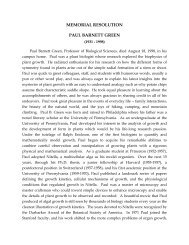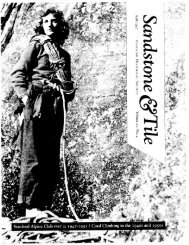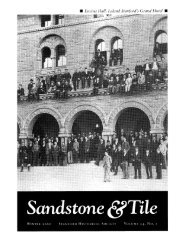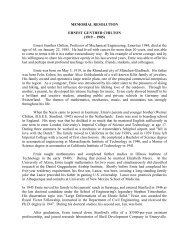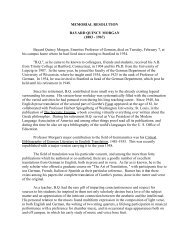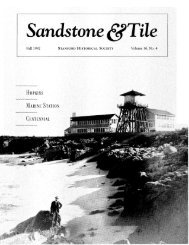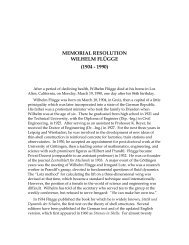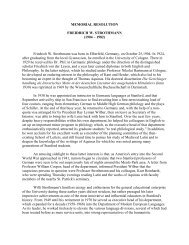memorial resolution alan t. waterman - Stanford Historical Society
memorial resolution alan t. waterman - Stanford Historical Society
memorial resolution alan t. waterman - Stanford Historical Society
Create successful ePaper yourself
Turn your PDF publications into a flip-book with our unique Google optimized e-Paper software.
<br />
MEMORIAL RESOLUTION <br />
ALAN T. WATERMAN <br />
(19182008) <br />
SenD#6447 <br />
Alan Waterman, scientist, advisor to students, outdoorsman, lifelong athlete, passed <br />
away on January 9, 2008 at the age of 89. Notable as a pioneering investigator of radio <br />
propagation in the earth’s atmosphere and for a teaching career at <strong>Stanford</strong> that spanned <br />
some 31 years, he was also known for his accomplishments as a mountain climber and as a <br />
lifelong athletic competitor. <br />
Alan was born in 1918 in Northampton, Mass. As a youngster he took long canoe <br />
trips with his father and younger brothers. His father, a Yale physicist, was the chief <br />
scientist of the Office of Naval Research after World War II and was then chosen by <br />
President Truman to become the first director of the National Science Foundation. <br />
The younger Waterman majored in Physics at Princeton and was a letterman on the <br />
Princeton track team. He graduated in 1939 and then moved to the California Institute of <br />
Technology, where he earned another bachelor's degree and during the wartime years <br />
1942‐46 investigated the effects on radio propagation of turbulence and layers in the <br />
Earth’s atmosphere. Alan then attended Harvard, where his Ph.D. thesis, completed in <br />
1952, was entitled “Ionospheric Absorption of Obliquely Incident Radio Waves.” In 1952 he <br />
obtained a Research Associate position in the Radioscience Laboratory at <strong>Stanford</strong> and in <br />
1958 received the faculty appointment in Electrical Engineering that he held until <br />
becoming emeritus in 1983. <br />
At <strong>Stanford</strong> Alan established a research program on various aspects of trans‐horizon <br />
signal propagation, employing antenna arrays in the Dish area behind <strong>Stanford</strong>. In the early <br />
years his research focused on the direct problem of measuring the properties of waves <br />
reflected from or transmitted through the complex atmospheric medium, and in the later <br />
years moved to the difficult inverse problem of using the properties of received scattered <br />
and transmitted signals to infer the structure and dynamics of the atmospheric medium <br />
through which they had passed. In the course of this work Alan served as author or <br />
coauthor of 31 papers and reviews that appeared in the Proceedings of the IRE (Institute of <br />
Radio Engineers), in the IRE Transactions on Antennas and Propagation and in the Journal <br />
Radioscience. <br />
Alan accomplished much as an advisor and teacher of students. He contributed <br />
substantially to the development and teaching of graduate and undergraduate courses in <br />
electromagnetic theory and wave propagation. Among his Ph.D. students were several who <br />
went on to distinguished research and teaching careers in major universities such as <br />
Dartmouth and <strong>Stanford</strong>. Alan was elected a Fellow of the IEEE (Institute of Electrical and <br />
Electronic Engineers) in 1965.
Alan T. Waterman Memorial Resolution—continued… <br />
After becoming emeritus in 1983, Alan was regularly recalled to active duty in the <br />
EE department, both for the purpose of teaching his favorite courses on electromagnetism <br />
and radio propagation and for serving in the important role of advisor to freshman and <br />
sophomore undergraduates. He was an advisor to the IEEE student organization and in <br />
1991 was cited by the EE department for his exceptional service “in teaching, research, and <br />
advising.” <br />
Alan was involved in a number of professional activities outside the university. He <br />
was an active member of the IRE/IEEE, served for years on the U.S. National Committee of <br />
the International Radioscience Union (U.R.S.I.), and from 1978 to 1981 was Chair of one of <br />
the U.R.S.I. international committees. From 1988 to 1990 he served as editor of the journal <br />
Radioscience published by the American Geophysical Union. <br />
Alan served on a number of advisory panels of the National Academy of Sciences <br />
and as a consultant to various organizations. In 1982 he was invited to visit the Max Planck <br />
Institute for Aeronomy for discussions and study of the problem of wave scattering from <br />
non‐ionized air. He was a member of a number of societies devoted to scholarship, <br />
including the American Physical <strong>Society</strong>, the American Geophysical Union, the New York <br />
Academy of Sciences, and the American Association of University Professors. <br />
Alan’s work on radio probing of the Earth’s atmosphere, including trans‐horizon <br />
radio propagation, brought him research support from the Defense Department, but in the <br />
late 1960s and early 1970s made him a target for campus protests against military‐<br />
sponsored research. Waterman stoutly defended his defense contracts at an Academic <br />
Council hearing and in letters to the editor of the <strong>Stanford</strong> Daily. “He stuck to the line that <br />
what he was doing was basic research, though it had applications in all sort of fields,” said <br />
Dane Waterman, one of Al’s two sons. Alan became involved in the celebrated case of <br />
Associate Professor H. Bruce Franklin involving an incident at the campus computer center <br />
in 1971, testifying against Franklin before a faculty advisory board. In the aftermath of that <br />
turbulent period the university pulled away from classified defense contracts, and as his <br />
research funding ebbed, Waterman shifted his attention from research to teaching and <br />
raising his children.<br />
Alan met his wife, Lori, in New York City on VE Day in 1945. Lori and he were <br />
married for 54 years, until her death in 2001. They loved traveling together; an artist, she <br />
would sketch the landscape while he went rock climbing. <br />
Waterman loved mountain climbing and was reputed by a family member to have <br />
“climbed basically anything south of Alaska in the Americas,” including peaks in the Andes. <br />
In 1997, when he went to Colorado to climb with other Princeton alumni, he was the oldest <br />
climber there. <br />
Running was another of Waterman's passions. Sometime around 1964 he helped <br />
form the Angell Field Ancients (AFA), a group of <strong>Stanford</strong> and community runners who <br />
gathered at noon at <strong>Stanford</strong>’s Angell field track. He was an early recipient of the AFA <br />
Golden Jock award, presented annually to an AFA member in recognition of having
Alan T. Waterman Memorial Resolution—continued… <br />
achieved distinction within the group, however modest. He enthusiastically supported his <br />
fellow runners, helping pace them through time trials and inviting colleagues attending a <br />
conference in a foreign city to join him in exploratory runs. Noted for his exceptionally <br />
smooth running style, strength, and b<strong>alan</strong>ce, Alan in his 50s could still run a mile in less <br />
than five minutes. Family members said he once held a national steeplechase record for <br />
runners 55 and older.<br />
In the final years of his life Al suffered greatly from osteoporosis, making it <br />
increasingly difficult for him to be physically active. He welcomed visitors most warmly <br />
and from time to time was able to attend functions on the campus. He did his best to go to <br />
major track meets, but in his last years was forced to give that up with regret. <br />
He was a guitarist and cellist who loved opera, Gilbert and Sullivan operettas and <br />
folk songs, especially old Scottish ballads. <br />
Al remained mentally alert to the end. In the last two weeks of his life he was still <br />
reciting from memory his favorite passages from Byron, Scott, Shakespeare, Shelley and <br />
Wordsworth, his daughter‐in‐law said. “Two days before he died, he asked that my two <br />
girls come to the hospital and sing him some Gilbert and Sullivan,” she said. <br />
Al was a quiet, gentleman who was much respected by his colleagues and was <br />
particularly loved by those who were privileged to share in his lifelong enthusiasms for the <br />
outdoors and for track and field. <br />
<br />
Committee: <br />
<br />
Don Carpenter (Chair) <br />
Donald Cox <br />
Dan Stober <br />
Tony Fraser‐Smith <br />


